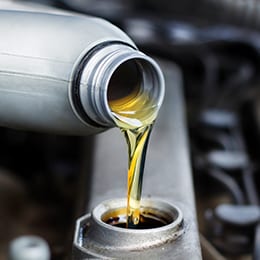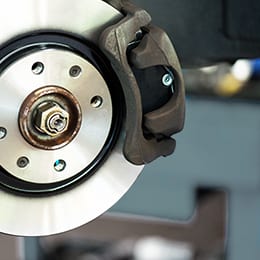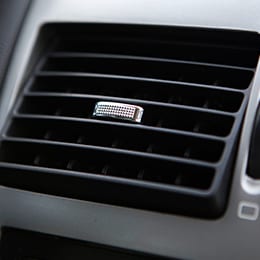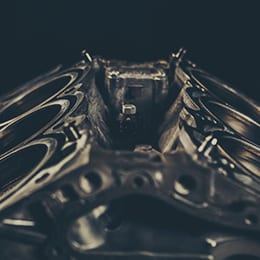What is A Car Transmission?
The transmission in your car is a workhorse that sends power created by the engine to the wheels based on the driver’s desired speed. With the assistance of gear ratios, the transmission is able to maintain the engine’s RPM as well as the RPM of the wheels at the most ideal rates, sending power to the differentials which turn the wheels. A manual transmission requires the driver to manually shift gear ratios, an automatic transmission, with the assistance of fluid, delivers the required pressure to activate clutches and other internal components that determine the proper gear based on speed and direction.
Because the transmission is a major component that the vehicle relies on for operation, the transmission should be cared for just as much as the engine. Regular transmission maintenance is vital as it helps to prevent major transmission repairs down the road. When repairs are needed, you should seek out a reliable, knowledgeable, and certified technician for the best outcome for your transmission. Each transmission service at Sun Devil Auto includes a free, comprehensive inspection prior to performing any services, giving you peace of mind.
Free Transmission Inspection Checklist
- Check Fluid Levels
- Road Test
- Engine Operation Test
- Visual Inspection of Axles, CV Joints, Boots, & Other Potential Factors
- Visual Inspection of Transmission & Engine Mounts
- Check for Leaks and Seeps
- Visual Inspection of Driveshaft and Undercarriage
- Check All Linkages
- Visual Inspection of Cooling System Operation
- Visual Inspection of Transmission Pan
Our technicians are expertly trained to diagnose the issue and recommend the best way to get your car back on the road. Plus, we guarantee our work in writing and we beat the rates that the dealership quotes. If a transmission rebuild is necessary, you can trust our trained technicians to complete the job as quickly as possible. We have been rebuilding auto transmissions in the Phoenix area for over 4 decades. We also repair clutches in manual transmissions and differentials.
Transmission Fluid Flush and Replacement
Transmission fluid in your vehicle is an essential fluid that ensures your transmission operates efficiently, smoothly, and properly. Just like your engine oil, transmission fluid requires regular maintenance to maintain optimal temperatures, viscosity, and performance. What does transmission fluid do?
- Lubricates – Keeps vital, moving components inside your transmission lubricated to prolong their life and maintain proper operation.
- Hydraulic Fluid – Transmission fluid is designed to create pressure, via small passages, to move the clutches to shift the transmission. In modern transmissions, they employ a series of pulleys that are driven with pressure to guarantee the chain or belt, rides in the proper place.
- Anti-Foaming Agent – Transmission fluid contains an additive that prevents foaming from the inside of the transmission as a natural result of the circulation.
- Cleanser – Transmission fluid is a high-detergent fluid that cleans and washes the interior of the transmission over and over as the fluid travels throughout. The purpose of the cleanser is to prevent debris from getting lodged in the narrow passages where fluid creates pressure and to maintain a clean surface for internal friction materials and clutches.
- Coolant – The transmission creates a significant amount of heat from the friction of moving components. All vehicles are equipped with a transmission cooler that allows the fluid to pass through, dissipate heat, and travel back to the transmission body, keeping it cool. Over time, the cooling properties of transmission fluid break down, losing its effectiveness.
Over time transmission fluid will break down from heat at the friction surfaces, heat from the engine, heat from the undercarriage, and heat from ambient temperatures. The additives begin to wear down and diminish the fluid’s ability to perform its job efficiently. Fluid becomes filled with debris as smaller particles and contaminants are held in suspension in the fluid. It is recommended that you service your vehicle regularly and check the condition of the fluid (where applicable) to identify any possible concerns before the situation worsens, resulting in costly repairs.
Transmission Rebuilds
Auto transmission repair such as rebuilding can be more cost effective versus replacing the entire transmission with a new or re-manufactured unit. The majority of components inside your transmission are intended to last the entire lifetime of the vehicle. However, there are certain wearable mechanisms within the transmission that require replacement with age, wear, and driving habits.
It’s important to note that during the later stages of wear, there are some parts that may fail, and in the event of a catastrophic failure, larger components may require service. Ideally, when your transmission experiences difficulties, only the failed pieces will require replacement. This is the most cost-efficient way to repair your vehicle over replacing the entire assembly and other components that are otherwise unnecessary to replace, saving you money.
During the diagnostic process, the technician will test-drive the vehicle in an attempt to duplicate the concern and utilize test equipment to observe the transmission’s operation as well as electronic components. Based on the results, it can then be determined if the problem with the transmission exists internally, externally, or by control failure such as the transmission control module, engine control module, or power train module.
At that point, it may be necessary to remove the transmission from the vehicle, disassemble it, and inspect the internal workings determine what needs to be replaced. Once the final inspection is complete, a service quote will be provided, and the transmission will be rebuilt with a new torque converter, new fluids, and other gears and mechanisms that are required.
Additionally, the transmission cooler lines and assemblies will be properly flushed to remove debris to safeguard against any fragments contaminating the rebuilt unit. The vehicle will be road tested and checked for leaks in the transmission prior to its return to you. Most reputable shops will guarantee the transmission with a 12, 24, or 36 month nationwide warranty on the repairs to ensure your investment is covered.
Through regular service and proper operation, a transmission can last you for the life of your vehicle without requiring major service. Ask your service provider to check the fluid frequently (where applicable) and advise you how to keep your vehicle running for many miles.
Frequently Asked Questions About Auto Transmission
Q: How often to change transmission fluid?
A: Most transmissions should be flushed every 30,000 miles, not to exceed 50,000 miles. Most vehicle manufacturers have guidelines for checking the fluid or no guidelines for service at all, however, the additives in the fluid over time become depleted and need to be replenished, even in sealed units.
Q: How to check transmission fluid?
A: Most new transmissions do not have a traditional dipstick to check fluid levels. In most cases, you will need to consult a service professional to examine the condition and levels of the fluid for you. Some require the use of a special tool to access the transmission.
Q: How much is a transmission flush?
A: Transmission fluid flushes vary in price based on the type of transmission, type of fluid used, and oil capacity. Transmission flushes can range from $160 to over $400, depending on your vehicle. We recommend speaking to your local service center to receive the most accurate pricing based specifically on the conditions for your vehicle.




